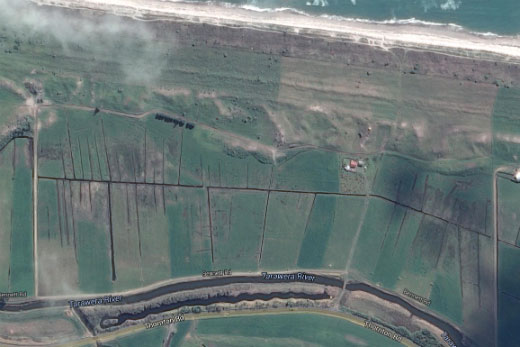Whakatane District Council has announced they will not appeal the Environment Court decision to decline the land designations and resource consent for a proposed wastewater treatment plant at Matata.
Via a message on their Facebook page, the council says cost and delay associated with pursuing an action in the High Court and uncertainty surrounding the final outcome is unlikely to deliver a good result for the Matata community, and they are looking at alternatives.
Consent for the Matata sewerage scheme is denied partly because there is nothing preventing wastewater pumped into the dunes at the top of the picture from leaching into adjacent farm drains as well as the Tarawera River. Photo: Google Maps.
The judgement itself is scathing of Whakatane District Council's attempt to push the project through the consents process.
In upholding an appeal by Sustainable Matata against the resource consent obtained by Whakatane District Council, the Environment Court rips up the existing consents and sends the council back to do it again.
'The conditions of consent do not clearly identify which consents relate to which site, or the extent to which certain activities, such as earthworks and sediment discharge, are authorised as a result of the designation itself,” says the Judge.
The scheme proposes a pumping and treatment station on Maori land adjacent to land earmarked for papakainga development. Odour issues from the plant and an insufficient barrier distance mean the plant's air discharge is cancelled.
The groundwater disposal of wastewater from the plant is another stopping point. It is recognised that the groundwater will most likely pollute adjacent farm drains and the nearby Tarawera River, which the Judge says could be illegal.
'Overall, the applications and consent conditions are ambiguous, and would be difficult to enforce,” adds the Judge.
'The Independent Commissioner's decision relies on the Applicant's Assessment of Environmental Effects and consent conditions, and as a result is unclear and potentially ultra vires in some respects.
'Considerable work would be required to generate an appropriate and enforceable set of consent and NOR conditions if consents are to be granted.”
The lack of fundamental information and the brevity of the independent commissioner's explanation of the issues or reasons for the consented conditions that were appealed, are also noted.
The submission of the Raupatu Trust was disregarded, with no adequate reasons given by the commissioner, says the Judge.
The decision was prior to the 2014 Freshwater Policy Statement which relates to the scheme's intended pollution of groundwater and adjacent waterways.
The Judge continues: 'There is no analysis of issues or reasoning to justify the decision. For example, in the 12-page decision, the analysis of issues suggests by the conclusion of the hearing there were relatively few matters of significance that remained in contention.
'This overlooks the consent authority's obligation to give reasons for its decision under the Act.
'Some conclusions as to the Applicant's case before the Council's Independent Commissioners were different from the Applicant's evidence before us. For example, the Independent Commissioner's decision states:
‘The water quality and in-stream ecology of the Orini Stream (and subsequently the lower Tarawera River) is unlikely to be affected.'
'The evidence before us was that there would be a degrading of water quality in the Orini Stream.
'We accept that the evidence might have been the same before the Commissioners, but subject to weighing given their conclusion that the adverse effects were no more than minor.
'Many statements are made that requirements are met without any reason provided for such statements.
'The Commissioners' decision is heavily reliant on the section 42A report which was not made available to the Court.
'This does not assist us understanding what applications the Independent Commissioners thought they had before them. The decision is jointly that of the Regional Council and the District Council through a panel of independent hearing commissioners.
'The decision refers to a total of five resource consents. There is only evidence of four being applied for. On one view the consents are void for uncertainty given the applications are vague in the extreme.”
The resource consent for discharge to air at the proposed site is cancelled. The three designations relating to the site for a Wastewater Treatment Plant, Buffer zone and access are also cancelled.
The application for designation and discharge consents to air and water relating to the Land Application Field are adjourned to allow Whakatane District council to consider whether it wishes to pursue consent on appropriate conditions.



0 comments
Leave a Comment
You must be logged in to make a comment.